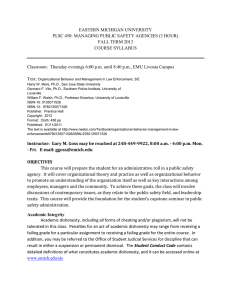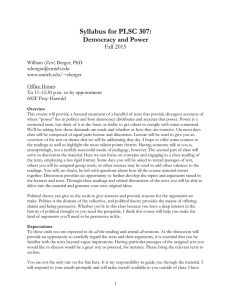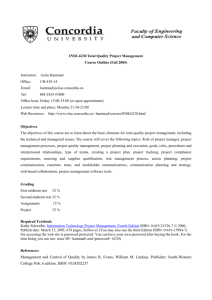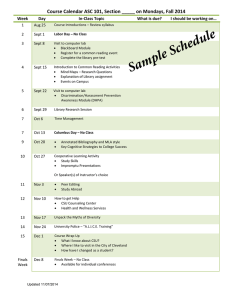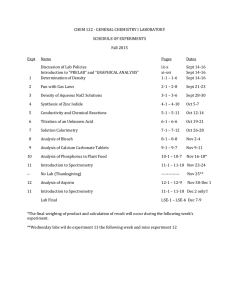Syllabus for PLSC 213: Introduction to Political Thought Fall 2015
advertisement
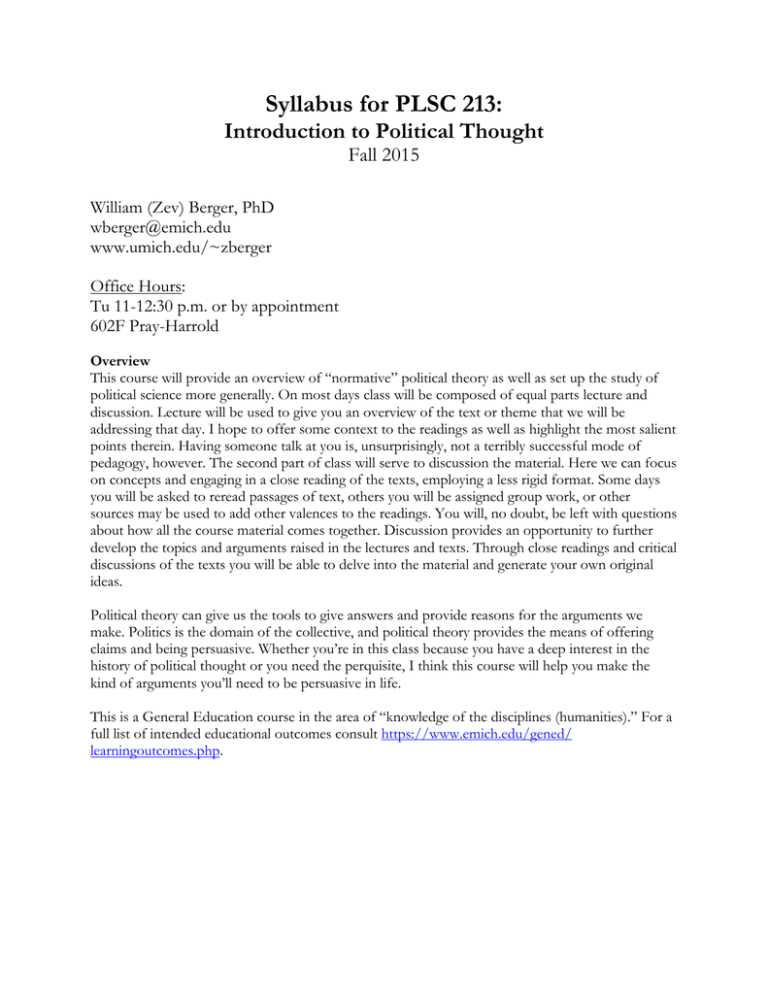
Syllabus for PLSC 213: Introduction to Political Thought Fall 2015 William (Zev) Berger, PhD wberger@emich.edu www.umich.edu/~zberger Office Hours: Tu 11-12:30 p.m. or by appointment 602F Pray-Harrold Overview This course will provide an overview of “normative” political theory as well as set up the study of political science more generally. On most days class will be composed of equal parts lecture and discussion. Lecture will be used to give you an overview of the text or theme that we will be addressing that day. I hope to offer some context to the readings as well as highlight the most salient points therein. Having someone talk at you is, unsurprisingly, not a terribly successful mode of pedagogy, however. The second part of class will serve to discussion the material. Here we can focus on concepts and engaging in a close reading of the texts, employing a less rigid format. Some days you will be asked to reread passages of text, others you will be assigned group work, or other sources may be used to add other valences to the readings. You will, no doubt, be left with questions about how all the course material comes together. Discussion provides an opportunity to further develop the topics and arguments raised in the lectures and texts. Through close readings and critical discussions of the texts you will be able to delve into the material and generate your own original ideas. Political theory can give us the tools to give answers and provide reasons for the arguments we make. Politics is the domain of the collective, and political theory provides the means of offering claims and being persuasive. Whether you’re in this class because you have a deep interest in the history of political thought or you need the perquisite, I think this course will help you make the kind of arguments you’ll need to be persuasive in life. This is a General Education course in the area of “knowledge of the disciplines (humanities).” For a full list of intended educational outcomes consult https://www.emich.edu/gened/ learningoutcomes.php. Expectations To those ends you are expected to do all the reading and attend all sessions. As the discussion will provide an opportunity to carefully regard the texts and their arguments, it is essential that you be familiar with the texts beyond vague impressions. Having particular passages of the assigned text you would like to discuss would be a great way to proceed, for instance. Please bring the relevant texts to section. You are not the only one on the line here. It is my responsibility to guide you through the material. I will respond to your emails promptly and will make myself available to you outside of class. I have never refused a reasonable request to meet outside of my scheduled office hours. Furthermore, in class my job is to help you engage the material. I will respond to emails within 24 hours (48 on weekends), but I will not read paper drafts. You must, however, include the tag PLSC213 in the subject line of your email. Finally, if you do not follow the class discussion let me know, as chances are there are others who are confused as well. Your job is to learn, mine is to help you do that. Components of Evaluation Introductory Paragraph Essay 1 – 5% Paper 1 Draft – 5% Paper 1 Final – 15% Introductory Paragraph Essay 2 – 5% Paper 2 Draft – 5% Paper 2 Final – 15% Group Report – 5% Midterm – 7.5% Exam – 27.5% Participation – 5% Attendance – 5% 10/2 10/16 10/30 11/6 11/20 12/4 12/10 10/6 12/17 Papers I will circulate prompts and rubrics for each written assignment one week in advance of the due date. All papers must be emailed to me by 11:59 p.m. on the due date. Unless you have received a written extension from me, I will assign a one third grade penalty for each day the paper is tardy. This can work in your favor, though. If you believe you can improve your paper by more than a half grade with 24 hours of work you may feel free to take the extra time. On plagiarism: please don’t do it. A plagiarized paper will result in a grade of 0, and may be referred to the EMU Office of Student Conduct. Plagiarism is any time you use someone else’s words or thoughts without ascribing credit. You can learn more here: http://www.emich.edu/facdev/teach-resources/Plagirarism1.php. A good bet to avoid plagiarism is to cite all the material you consult when composing a paper. Participation Class participation is an important component of your responsibilities in this course, which entails you not only showing up, but also engaging the material once there. Your grade is therefore, in part, contingent on your attendance and participation. It is also important that you participate in the discussion by sharing thoughtful ideas that draw from the readings and lectures. You won’t gain any points by speaking merely for the sake of your grade. That being said, not everything that comes out of our mouths is worthy of enduring record. That’s ok. Formulating a vague question or observation about the material often helps you and the others in class gain greater clarity. I'm afraid that if you're shy you'll just have to work through it. I ask that you sign in every day. If you can’t attend class due to exigent circumstances, though, please just email me one hour before class. So long as the reason is compelling I will not count the absence. As part of the course engagement I require you to attend my office hours at least once during the semester. This is so that I get a chance to speak with you one-on-one and hear your comments and critiques and also to provide you with my thoughts. Please don't wait until the end of the semester to take advantage of this resource. Accommodation You are a wonderful group of motivated and intelligent people. That being said, we each possess unique skills and challenges that affect our ability to participate in the classroom. If you require accommodation, for any reason, please let me know and I will do everything I can to facilitate your ability to learn. Whether these accommodations pertain race, ethnicity, religion, sexuality, financial background, gender, or physical or mental disability (or other than I haven’t caught) I am committed to welcoming you into the classroom. I only ask that you let me know how I might best oblige. In particular, I want to point you towards the Disability Resource Center (http://www.emich.edu/ drc/index.php) and Counseling and Psychological Services (https://www.emich.edu/ caps/services/index.php) to learn more about the resources the university has to help you. Grades I reserve the right to curve the class at the end of the semester in order to achieve a class mean in the range of a B-/B. This procedure will only be used to improve individuals’ final grades. Texts I will find online mirrors of most all the texts I assign. I suggest that you buy the copy of the book I assign, but I respect that some of you are on a tight budget, and I don’t want to tax it any more than necessary. Required The Dark Knight Returns by Frank Miller ISBN 1563893428 Persepolis by Marjane Satrapi ISBN 0375714839 Recommended Leviathan by Thomas Hobbes ISBN 0872201775 Second Treatise on Government by John Locke ISBN 0915144867 Basic Political Writings by J.J. Rousseau ISBN 1603846735 On Liberty by J.S. Mill ISBN 978-0-915144-43-3 The Prince by N. Machiavelli ISBN 0226500446 The Republic by Plato ISBN 0465069347 The Trial and Death of Socrates by Plato ISBN 0872205541 Schedule Sept. 8 - What is Political Theory? What is a model? Sept. 10 – Machiavelli, The Prince. Sept. 15 – No Class, Rosh HaShannah Sept. 17 – Machiavelli, The Prince. Sept. 22 – Hobbes, Leviathan, intro. Sept. 24 – Hobbes, Leviathan, chpt 1-4. (An introduction to game theory.) Sept. 29 – Group work, (meet outside of class) Oct. 1 – Leviathan, chpt 12-17. What is a best response? Oct. 6 – Midterm I Oct. 8 – Leviathan, chpt 18-25. Oct. 13 – Scott Page, Diversity. (“Why move beyond Hobbes?”) Oct. 15 – J.S. Mill, On Liberty chpt 1 & skim 2 Oct. 20 – Locke, 2nd Discourse on Govt. chpt 1-5. Oct. 22 – 2nd Discourse on Govt. chpt 6-10. Oct. 27 – Hume, “On the Original Contract.” Oct. 29 – Miller, The Dark Knight Returns. Nov. 3 – Nowak, “The Five Rules for the Evolution of Cooperation” (2006). Nov. 5 – Rousseau, Discourse on Inequality (selections). Nov. 10 – Rousseau, On the Social Contract, Part I. Nov. 12 – Rousseau, On the Social Contract, Part II and III. Nov. 17 – Marx, The Communist Manifesto. Nov. 19 – Plato, The Republic, bk 1. Nov. 21 – Plato, The Republic, bk 2. Nov. 26 – Martin Luther King, Jr. “Letter from a Birmingham Jail.” Nov. 28 – No Class, Thanksgiving Dec. 1 – Satrapi, Persepolis. Dec. 3 – Plato, Apology. Dec. 8 – William O. Douglas, Points of Rebellion. Dec. 10 – Course Wrap Up. Dec. 17 – FINAL EXAM 7:30a Finer Print - Participation requires that you act as constructive member of the class by showing up consistently and on time, answering questions, and adding your own insight and analysis when appropriate. - The classroom must remain a safe space for all participants. Any hostility, verbal or physical, will not be tolerated (and will count against your grade—though that should be the least of your concern). - That being said, the course will address controversial issues and it is important for people to have the security necessary to ask questions they otherwise might shy away from. For example questions pertaining to the legitimacy of gun rights, pregnancy termination, gay marriage, and racial discrimination are all liable to be raised. While we must all remain sensitive to the commitments and vulnerability of others, it is important to keep and open mind and be willing to engage and discuss answers to questions you may have thought obvious or even insulting. - Courtesy is mandatory. No side conversations, texting, facebooking, IG-ing, disrupting, etc. - If your absences are too abundant, even with prior notification, I may choose to dock your participation and attendance grades. - If I curve the grades I will likely use this algorithm: y = 100(1-p)xp where x is your uncurved grade and p is the curving parameter - I will not round the final grades - Grading thresholds: A+ 97 B+ 87 C+ 77 D+ 67 - A 93 B 83 C 73 D 63 A- 90 B- 80 C- 70 D- 60 Letter grades will be assigned a point value in the middle of the numerical range e.g. B = 85, B- = 81 - I may update the syllabus during the semester. If that happens I will post the new version with a version number, and send an email out marking the changes.
